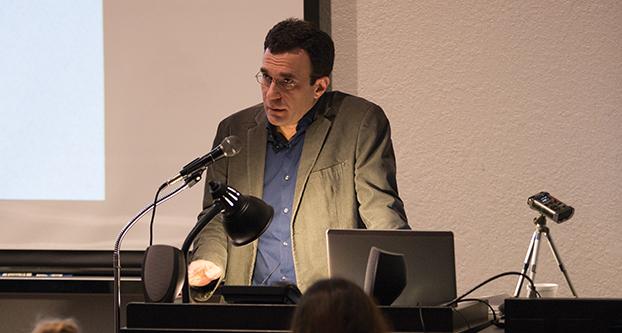An overflow crowd packed the University Business Center for Armenian author Vahé Tachjian’s lecture, “Building the ‘Model Ottoman Citizen’: Life and Death in the Region of Harput-Mamüretülaziz.”
The lecture, hosted by the Armenian Studies Program at Fresno State, was the first in a series leading up to the 100th anniversary of the Armenian Genocide in April.
Tachjian reconstructed the events leading up to the Armenian Genocide based on articles, lectures, memoirs and letters from the Kharpert Plain region of the Ottoman Empire written by two people living in Harput.
“I’m trying to reconstruct the everyday life of Armenians,” Tachjian said.
“This paper is also an attempt to bring together the scattered material reading in Armenian about Harput. At the same time I seek to show the inexplicable value of Armenian primary sources to study the history of Ottoman Armenians and the Ottoman Empire in general.”
Tachjian, director and chief editor of the “Houshamadyan Project,” an effort that aims to reconstruct Ottoman Armenian town and village life, is a Lebanon-born earned his doctorate in history and civilization at the Ecole des Hautes Etudes en Sciences Sociales in Paris.
His research covers the period of the French occupation of Cilicia, Syria and Lebanon between the two world wars, the Armenians in the Ottoman Empire and refugee problems in the Middle East.
Tatevik Houhannisyan, secretary of the Armenian Students Organization, said she felt privileged Tachjian came from Germany to speak to the Fresno State community.
“I think it’s important for non-Armenian people to learn all this information especially because of the 100th anniversary of the Armenian Genocide,” Houhannisyan said. “We want more people to be educated about the past history the Armenians’ had.”
The Armenian Studies Program will host another lecture Feb. 11 titled “The Armenian Genocide in Film: Theoretical and Comparative Perspectives” by Dr. Myrna Douzjian.
“In the future, we make decisions, and if we are educated about not only Armenian history but other histories too, we make better decisions in life and when we become important people,” Houhannisyan said. “We make better decisions for the bigger population were in charge of. It’s important to educate ourselves about history, about things that have happened in the past.”




